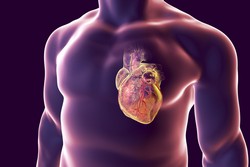Improved cardiac regeneration after injury
Following myocardial infarction (MI), cardiac progenitor cells (CPC) - a progenitor cell population within the myocardium - are activated to proliferate, migrate to the infarct site, and facilitate cardiac regeneration. Since CPCs constitute putative therapeutic targets to diminish cardiac injury after MI, insight into their biology is necessary. The EU-funded HEART BETAS project focused on β- adrenergic receptor signalling in CPCs after MI. They studied these cells and how they are affected by therapies currently used in the management of cardiovascular diseases. β-adrenergic receptors respond to the neurotransmitter epinephrine and are responsible for smooth muscle cell relaxation and bronchodilation. Scientists worked under the hypothesis that β2-adrenergic receptor signalling favours the activation of endogenous CPC and improves cardiac remodelling after MI. Using a mouse model of MI, researchers measured β1 and β2 adrenergic receptor expression in CPCs, before proceeding with evaluation of response to treatment with β-adrenergic agonists/antagonists. Supporting the initial working hypothesis, cell viability and differentiation assays validated a functional role of CPC β2 adrenergic receptors. Researchers further performed immunofluorescence analysis of the heart tissue for proliferation, cardiomyocyte surface area, and vessel density to assess the impact of surgery or drug treatment. Results showed that MI induced a significant increase in the percentage of CPCs, while pre-treatment with the β2 adrenergic receptor agonist fenoterol prolonged this response, resulting in a significantly elevated number of CPCs. Importantly, infarct size was significantly reduced in mice pre-treated with fenoterol, albeit with no obvious amelioration in cardiac function. Overall, the study demonstrated that β2 adrenergic receptors can play a role in CPC proliferation and differentiation with their expression level adapting to stressful environments. Given the socioeconomic implications of MI and ischaemic heart disease, insight into the pharmacological manipulation of the endogenous healing process of the heart is expected to improve patient outcome.







